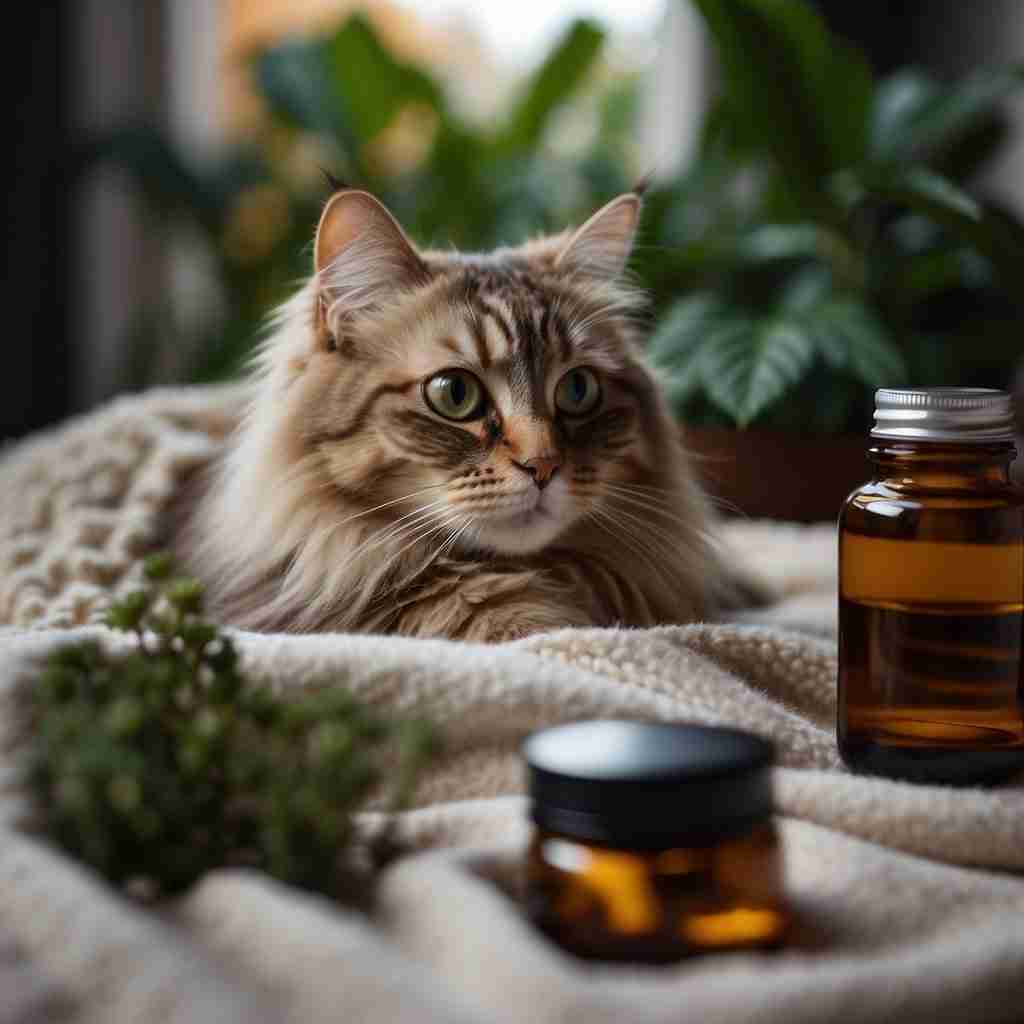Natural remedies for seizures in cats can be as perplexing as they are distressing, both for you as a loving pet owner and for your furry companion.
Have you noticed your cat exhibiting unusual behavior, such as twitching, losing consciousness, or convulsions?
These could be signs of a seizure, and while it’s essential to consult with a vet immediately, it’s also important to address the underlying cause of the issue and not just the symptoms.
A vet can run tests to determine the underlying cause, such as epilepsy or other potential causes like brain tumors, stroke, infections, or toxins, and help implement the best treatment course.
Remember, natural remedies can supplement, but not replace, veterinary care when managing your cat’s seizures.
Natural remedies for cat seizures can include dietary changes, herbal supplements, stress management techniques, and the use of CBD oil.
These holistic treatments can help reduce the frequency and severity of seizures and improve the overall health and well-being of your beloved feline.

While no substitute for professional veterinary care, natural remedies can play a supportive role in managing your cat’s seizures. You’re right to be cautious and seek safe, gentle options to help your kitty.
For example, calming herbs like valerian root have been known to reduce stress in felines, potentially decreasing the likelihood of stress-related seizures.
In addition to natural remedies, incorporating stress management techniques such as environmental enrichment and regular exercise can also help support your cat’s well-being through a holistic approach, including the use of veterinary acupuncture at specific points in the body.
But remember, it’s not about choosing nature over science; it’s about integrating the best of both worlds to support your cat’s well-being, including controlling overactive nervous systems.
Now, let’s take a closer look at how you can navigate this challenge with care and awareness.
You’ll be pleased to know that by understanding your cat’s health and exploring natural treatment options mindfully, you can create a comforting environment that may help manage seizure episodes.
Regular exercise, along with your vet’s expertise, can make a real difference in your cat’s quality of life.
So, let’s get down to the nitty-gritty and help you help your feline friend by monitoring and managing seizure activity with a tailored treatment plan.
Key Takeaways
- Understanding your cat’s seizures is the first step toward managing their condition.
- Safe, natural remedies may complement traditional treatments under veterinary guidance.
- A balanced approach to seizure management can be achieved by integrating natural and professional care.
Comprehensive Guide to Natural Remedies for Seizures in Cats
Ever wondered how your diet could help your feline friend’s health? Just like in humans, diet plays a crucial role in managing health conditions, including seizures.
Incorporating high-quality proteins and eliminating potential allergens might just do the trick. Think of it as a meal makeover for your cat’s well-being!
When it comes to supplements, nature’s pantry offers some options:
- Valerian Root: For a chilled-out kitty, this herb is your go-to. It’s like a relaxing cup of tea but for cats. (1)
- Omega-3 Fatty Acids: These are the brain’s best friends, supporting nerve function and overall brain health. (2)
Can a peaceful environment be the answer to your cat’s jitters? Absolutely. Stress can sometimes trigger seizures, so creating a calm living space is key.
And don’t forget, regular playtime can ward off those nasty stress vibes, keeping your cat happy and healthy.
Remember, these are complementary approaches to support your cat’s health and should be discussed with your vet. Keep this guide handy, because when it comes to seizures, a little natural help goes a long way!
Implementing Natural Remedies Safely

Have you ever considered natural remedies for your cat’s seizures but felt unsure about how to use them safely? It’s crucial to approach alternative treatments with caution to avoid unintended consequences.
Here’s a guide to help you get started on the right paw!
Step 1: Consult Your Veterinarian
- Before trying any new treatment, talk with your vet.
- They can advise on the safety and interaction with current medications.
Step 2: Choose Evidence-Based Remedies
- Look for treatments with reported benefits, like valerian root for its calming effects.
- Avoid remedies without scientific support.
Step 3: Start Slowly
- Introduce one remedy at a time.
- Observe your cat’s response.
Step 4: Monitor and Document
- Keep a diary of seizure frequency and severity.
- Note any changes coinciding with the remedy’s use.
Remember, every cat is unique. What helps one may not help another.
Safety Tips:
- Never replace prescribed medication with a natural remedy without veterinary guidance.
- Keep track of doses; more is not always better.
Potential Efficacy:
- Some cat owners report positive changes with remedies like acupuncture.
- Scientific evidence is limited; anecdotal success stories can guide, but not guarantee, results.
Small changes can mean a big difference for your furry friend. With your vet’s approval and careful observation, trying out natural remedies can be done safely.
Ready to try a gentler approach? Your cat’s well-being is worth every cautious step!
Professional Veterinary Care and Natural Remedies
When to Seek a Vet’s Help
- Sudden Onset: Anytime your cat has a seizure, it’s crucial to consult with a vet, especially if it’s a new development.
- Frequency or Intensity Increases: Changes in the pattern of seizures warrant immediate veterinary attention.
Blending Natural Remedies with Veterinary Advice
| Professional Care | Natural Aids |
| Medications | Hydration: Ensure your cat has access to fresh water; dehydration can trigger seizures. (3) |
| Regular Check-ups | Stress Reduction: Consider natural calming aids like valerian root to reduce anxiety. (4) |
- Balancing Act: Your vet might be open to integrating natural solutions as part of a comprehensive care plan. Check with them before starting any new remedy.
Quick Tips
- Keep a Diary: Track your cat’s seizure episodes and potential triggers to share with your vet.
- Medication Matters: Always administer prescribed medications as directed. Some natural remedies might interfere with their effectiveness.
Remember: Using natural remedies does not replace the importance of professional veterinary care.
It’s essential to work closely with your vet to decide on the safest approach for your cat’s health and well-being. So, keep that dialogue open and here’s to better health for your whiskered companion! 🐾
Understanding Cat Seizures

Seizures stem from sudden, abnormal electrical activity in the brain, and they can manifest in several ways, ranging from noticeable shaking to more subtle signs.
Causes of Cat Seizures:
- Genetic factors: Some breeds have a predisposition. (5)
- Health conditions: Liver disease, epilepsy, or brain trauma. (6)
- Environmental factors: Exposure to toxins or poisons. (7)
Symptoms to Watch For:
- Sudden collapse or loss of consciousness
- Uncontrollable muscle activity, like twitching or shaking
- Abnormal behavior before or after the event
- Disorientation or confusion
Seizure Triggers:
- Stress
- Changes in medication
- Dietary indiscretions
Now, from a medical perspective, what’s going on during these seizures?
Picture your cat’s brain as an electrical circuit; during a seizure, there’s a sudden surge of activity that shouldn’t be there – it’s like an impromptu electrical storm.
Here’s the catch—they can be intracranial (within the brain, such as epilepsy) or extracranial (caused by external factors, like toxins affecting the brain or head trauma) and can be triggered by sudden changes in the environment or the body, including focal motor seizures and different types of seizures.
So, you’re asking, “How can I tell if it’s serious?” If your fluffy friend has a seizure, it’s worth a chat with your vet.
They can give your cat a thorough check-up to determine the cause and figure out the best plan of action.
Remember, while a one-off incident may be a fluke, recurrent seizures warrant immediate attention. Stay informed and keep your companion safe!
Real-World Applications and Case Studies

Case Study 1: Tuna, a charming Siamese, began having seizures out of the blue.
Her owner, Mia, decided to try Omega-3 supplements. With a diet rich in fish and flaxseed, Tuna’s seizures reduced over six months.
Mia kept a detailed journal of Tuna’s response, noting the frequency and intensity of the seizures.
Monitoring Tips:
- Keep a seizure log for your cat
- Note any dietary changes and responses
- Regularly consult with your vet
Real-life example time! Oscar, a spirited tabby, suffered from stress-related seizures.
His owners introduced a calming herbal blend into his routine and created a stress-free sanctuary in their home. Oscar’s episodes significantly decreased in frequency.
Adjustment Advice:
- Be flexible with treatments
- Watch for any side effects or improvements
- Adjust dosages as needed under veterinary guidance
Remember, while these stories are inspiring, they aren’t a one-size-fits-all solution. Every cat is unique! So, if you’re considering natural remedies for your cat’s seizures, keep these pointers in mind:
- Patience is key; natural remedies can take time
- Always maintain open communication with your vet
- Adjust and monitor treatments as you go; what works for one may not work for all
Empower yourself with these real-world successes and personalized monitoring, and you can see a world of difference in your cat’s health. Isn’t it worth a try for your furry friend?
Quick Recap

Let’s breeze through the key points we’ve covered about natural remedies for feline seizures. Remember, while these may aid in your cat’s comfort, always consult with a vet before trying new treatments.
- Valerian Root: A natural herb known for its calming effects; it might help reduce stress-related seizures.
- Dietary Management: Tailoring your cat’s diet with the help of a vet can influence the management of seizures.
- Stay Calm: Your composure during a seizure can impact your cat’s recovery.
Additional Resources:
- Books: “The Holistic Cat” offers insight into natural cat health care.
- Online Communities: Platforms like TheCatSite.com provide forums for support and experience sharing.
Remember, these tips are just the starting point. Your vet should be your go-to for managing your cat’s health. Stay informed and supportive; you’ll be well-equipped to help your furry friend.
Frequently Asked Questions
When it comes to your feline’s health, having the right information can make all the difference.
Here are some common questions and straightforward answers about natural remedies for cat seizures to guide you in caring for your furry friend.
Are there any risks associated with using natural remedies for cat seizures?
Yes, there are risks, as natural does not always mean safe.
Without proper veterinary guidance, some remedies could potentially worsen your cat’s condition. It’s critical to consult your vet before trying any new treatment.
What are some safe home remedies to address seizures in my feline friend?
Home remedies such as ensuring a stress-free environment and maintaining a routine can help manage seizures.
Additionally, some claim that adding omega-3 fatty acids to your cat’s diet might support brain health.
Which specific diets are beneficial for cats prone to having seizures?
A diet high in fats and low in carbohydrates, often referred to as ketogenic, may have potential benefits for cats with seizures, similar to its effects in humans.
It should always be monitored and approved by a veterinarian.
How do I know if a natural remedy is working for my cat?
You’ll notice fewer seizure episodes or a change in their severity. Keep a log of their occurrence and discuss with your vet to monitor the effectiveness of any remedy.
Can stress reduction techniques help in managing cat seizures?
Absolutely! Cats can be sensitive to stress, which may trigger seizures.
Techniques like providing a quiet space, playtime, and pheromone diffusers can contribute to reducing stress.
What should I do if my cat has an adverse reaction to a natural remedy?
If you notice any unusual symptoms or worsening of seizures, stop the natural remedy immediately and speak to your vet. Prompt medical attention is essential.
How quickly can I expect to see results from natural remedies?
The timeline can vary, but generally, natural remedies may take several weeks to show noticeable changes.
It’s a marathon, not a sprint, so patience and consistent follow-up with your vet are key.
- Free Online Casino Games: What You Need to Know - July 26, 2025
- Ideal Casinos Mobile: The Ultimate Guide to Mobile Betting - July 26, 2025
- The Ultimate Overview to Casino Site Gamings Online - July 26, 2025


